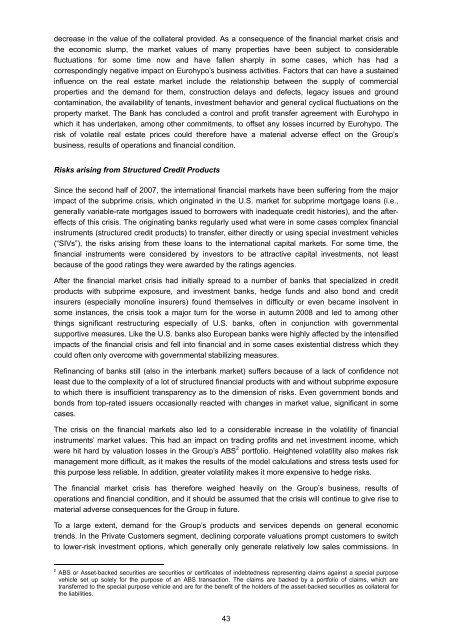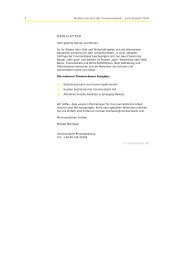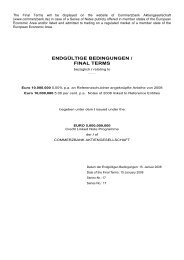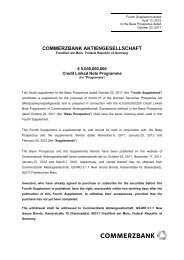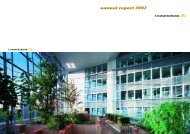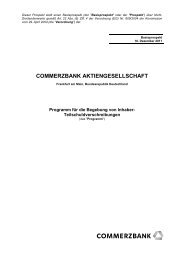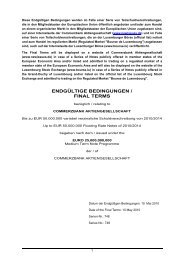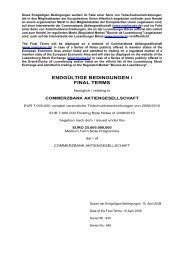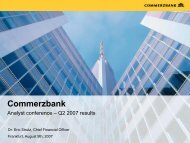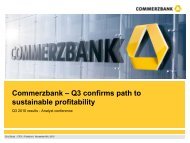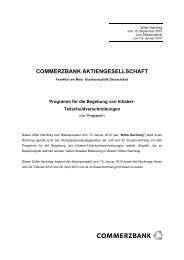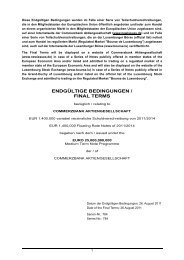COMMERZBANK AKTIENGESELLSCHAFT
COMMERZBANK AKTIENGESELLSCHAFT
COMMERZBANK AKTIENGESELLSCHAFT
You also want an ePaper? Increase the reach of your titles
YUMPU automatically turns print PDFs into web optimized ePapers that Google loves.
decrease in the value of the collateral provided. As a consequence of the financial market crisis and<br />
the economic slump, the market values of many properties have been subject to considerable<br />
fluctuations for some time now and have fallen sharply in some cases, which has had a<br />
correspondingly negative impact on Eurohypo’s business activities. Factors that can have a sustained<br />
influence on the real estate market include the relationship between the supply of commercial<br />
properties and the demand for them, construction delays and defects, legacy issues and ground<br />
contamination, the availability of tenants, investment behavior and general cyclical fluctuations on the<br />
property market. The Bank has concluded a control and profit transfer agreement with Eurohypo in<br />
which it has undertaken, among other commitments, to offset any losses incurred by Eurohypo. The<br />
risk of volatile real estate prices could therefore have a material adverse effect on the Group’s<br />
business, results of operations and financial condition.<br />
Risks arising from Structured Credit Products<br />
Since the second half of 2007, the international financial markets have been suffering from the major<br />
impact of the subprime crisis, which originated in the U.S. market for subprime mortgage loans (i.e.,<br />
generally variable-rate mortgages issued to borrowers with inadequate credit histories), and the aftereffects<br />
of this crisis. The originating banks regularly used what were in some cases complex financial<br />
instruments (structured credit products) to transfer, either directly or using special investment vehicles<br />
(“SIVs”), the risks arising from these loans to the international capital markets. For some time, the<br />
financial instruments were considered by investors to be attractive capital investments, not least<br />
because of the good ratings they were awarded by the ratings agencies.<br />
After the financial market crisis had initially spread to a number of banks that specialized in credit<br />
products with subprime exposure, and investment banks, hedge funds and also bond and credit<br />
insurers (especially monoline insurers) found themselves in difficulty or even became insolvent in<br />
some instances, the crisis took a major turn for the worse in autumn 2008 and led to among other<br />
things significant restructuring especially of U.S. banks, often in conjunction with governmental<br />
supportive measures. Like the U.S. banks also European banks were highly affected by the intensified<br />
impacts of the financial crisis and fell into financial and in some cases existential distress which they<br />
could often only overcome with governmental stabilizing measures.<br />
Refinancing of banks still (also in the interbank market) suffers because of a lack of confidence not<br />
least due to the complexity of a lot of structured financial products with and without subprime exposure<br />
to which there is insufficient transparency as to the dimension of risks. Even government bonds and<br />
bonds from top-rated issuers occasionally reacted with changes in market value, significant in some<br />
cases.<br />
The crisis on the financial markets also led to a considerable increase in the volatility of financial<br />
instruments’ market values. This had an impact on trading profits and net investment income, which<br />
were hit hard by valuation losses in the Group’s ABS 2 portfolio. Heightened volatility also makes risk<br />
management more difficult, as it makes the results of the model calculations and stress tests used for<br />
this purpose less reliable. In addition, greater volatility makes it more expensive to hedge risks.<br />
The financial market crisis has therefore weighed heavily on the Group’s business, results of<br />
operations and financial condition, and it should be assumed that the crisis will continue to give rise to<br />
material adverse consequences for the Group in future.<br />
To a large extent, demand for the Group’s products and services depends on general economic<br />
trends. In the Private Customers segment, declining corporate valuations prompt customers to switch<br />
to lower-risk investment options, which generally only generate relatively low sales commissions. In<br />
2 ABS or Asset-backed securities are securities or certificates of indebtedness representing claims against a special purpose<br />
vehicle set up solely for the purpose of an ABS transaction. The claims are backed by a portfolio of claims, which are<br />
transferred to the special purpose vehicle and are for the benefit of the holders of the asset-backed securities as collateral for<br />
the liabilities.<br />
43


